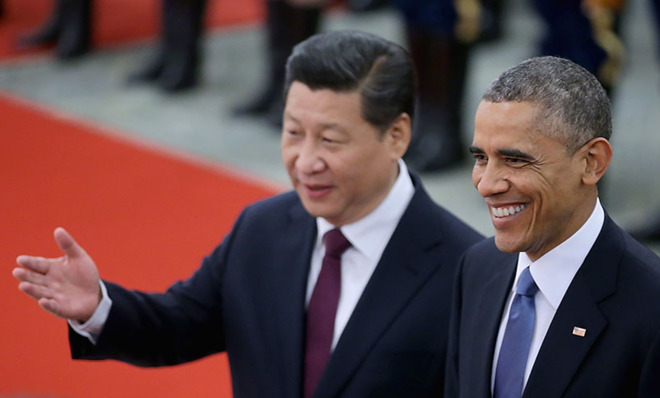Why the surprisingly impressive U.S.-China climate change deal is a triumph for both countries
The Obama administration is leaving Beijing with a massive diplomatic victory. And the Chinese went a long way toward achieving their policy goals as well.


A free daily email with the biggest news stories of the day – and the best features from TheWeek.com
You are now subscribed
Your newsletter sign-up was successful
In an agreement variously described as "historic," "a very big deal," and a "game changer," the U.S. and China have jointly agreed to pledges designed to aggressively curb carbon emissions growth. Much of the hyperbole is merited, following a deal that represents an immense win-win for both countries.
First, the details: The U.S. has promised to accelerate its carbon dioxide emissions cuts to 26-28 percent from 2005 levels by 2025, up from 17 percent. Meanwhile, the Chinese, in an abrupt departure from their previous reluctance to promise a cap on emissions growth, now say they are aiming for an emissions peak by around 2030. Furthermore, they will mandate that 20 percent of their energy come from renewables by that time. These pledges will likely be followed by targets for further emissions reductions through to 2050, negotiated in future meetings of the United Nations Framework Convention on Climate Change.
Much credit for the deal goes to President Obama's diplomatic team at the White House, the State Department, and the Department of Energy. After the 2009 nadir of the Copenhagen Accord, when the international community failed to agree on a replacement for the Kyoto Protocol, the Obama administration seized on clean energy cooperation as one of the bright spots in an otherwise tense and unsteady relationship with China.
The Week
Escape your echo chamber. Get the facts behind the news, plus analysis from multiple perspectives.

Sign up for The Week's Free Newsletters
From our morning news briefing to a weekly Good News Newsletter, get the best of The Week delivered directly to your inbox.
From our morning news briefing to a weekly Good News Newsletter, get the best of The Week delivered directly to your inbox.
Secretary of State John Kerry, in particular, who reportedly shepherded the negotiations, prioritized climate and clean energy in his dealings with his Chinese counterparts. This effort saw fruition in an agreement last year to phase out the use of hydrofluorocarbons (HFCs), another potent greenhouse gas.
Why have the Chinese apparently changed course? As I wrote for The Week when China announced plans for a nationwide cap-and-trade program, efforts to reduce carbon emissions fit with several priorities for the Chinese leadership. Promoting a more energy-efficient economy means less money is spent on importation of expensive fuels, which has both economic and geopolitical consequences for a country that is not rich with domestic energy sources.
Peaking coal usage, which would be a major force in reducing emissions in China, would also alleviate choking pollution in Chinese cities, which has become a politically sensitive topic that could ultimately undermine the legitimacy of the Communist Party.
Additionally, with its tense relationships with many of its neighbors, especially Japan, China may be seeking a short-term reputational boost by advancing a priority of the international community. The importance attached to it by the United States may also have signaled to the Chinese leadership that cooperation was essential to the overall health of the bilateral relationship.
A free daily email with the biggest news stories of the day – and the best features from TheWeek.com
Pure economic self-interest could be at play as well. The deal also advances cooperation and funding on clean energy technology, especially carbon capture and sequestration (CCS), a critically necessary tool for transitioning to a zero-carbon economy. According to analysis by IHS, of the top 10 solar photovoltaic systems manufacturers in the world, seven are either Chinese firms or have the bulk of their manufacturing facilities in China. Combined with the renewables mandate, which even the United States does not have, this sends a signal to manufacturers that they can expect robust demand from China for the intermediate future, an important step in building and protecting Chinese market share.
This agreement will likely push climate to the center of discussions for the next Group of 20 summit in December, no doubt to the chagrin of Australian Prime Minister Tony Abbott, who made sure it was not on the agenda. The progress between the U.S. and China not only puts pressure on Australia, but also on India, which, like China, had earned a reputation for recalcitrance when it came to submitting to any sort of promise for emissions cuts.
For the U.S. the main challenge, as Michael Levi of the Council on Foreign Relations pointed out, is domestic resistance. Not only is the Senate controlled by a party that by and large campaigned against new rules by the Environmental Protection Agency, but so are several state legislatures. And of course, there are a sizeable number of Democrats who are also wary of the EPA. State cooperation with the EPA is the key for making the EPA power plant rules work. If climate-skeptic state legislatures try to fight those rules in court, the delays would likely throw the timelines for emissions reductions out the door.
But it is difficult not to be optimistic coming out of today. For the Chinese to completely change its position is an excellent first step in what will now be a long road to Paris in 2015, where the global community will once again try to hammer out an international climate change agreement. As long as China perceives that constructive engagement on climate change issues is in its best interests, from both diplomatic and economic standpoints, it will continue to work with the United States to keep this on the international agenda.
Neil Bhatiya is a Policy Associate at The Century Foundation, where he works on issues related to U.S. foreign policy, with a specific focus on South Asia and climate change.
-
 How the FCC’s ‘equal time’ rule works
How the FCC’s ‘equal time’ rule worksIn the Spotlight The law is at the heart of the Colbert-CBS conflict
-
 What is the endgame in the DHS shutdown?
What is the endgame in the DHS shutdown?Today’s Big Question Democrats want to rein in ICE’s immigration crackdown
-
 ‘Poor time management isn’t just an inconvenience’
‘Poor time management isn’t just an inconvenience’Instant Opinion Opinion, comment and editorials of the day
